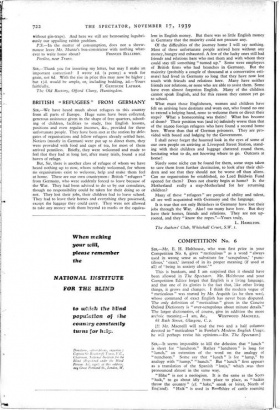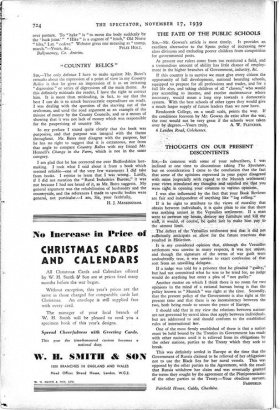COMPETITION No. 6
Sut,—Mr. E. H. Holthouse, who won first prize in your Competition No. 6, gives " meticulous " as a word " always used in wrong sense as substitute for ' scrupulous," punc- tilious," exact,' instead of in its proper meaning (if used at all) of ' being in anxiety about.' " This is bunkum, and I am surprised that it should have been allowed in The Spectator. Mr. Holthouse and your Competition Editor forget that English is a living language, and that one of its glories is the fact that, like other living things, it grows and changes. I think the modern vogue of " meticulous " was started by Mr. Asquith (as he then was), whose command of exact English has never been disputed. The only definition of " meticulous " given in the Concise Oxford Dictionary is " over-scrupulous about minute details." The larger dictionaries, of course, give in addition the more [If Mr. Macneill will read the two and a half columns devoted to " meticulous " in Fowler's Modern English Usage, he will perhaps revise his opinions.—ED. The Spectator.] SIR,—It seems impossible to kill the delusion that " lunch " is short for " luncheon." Rather " luncheon " is long for " lunch," an extension of the word on the analogy of " nuncheon." Some say that " lunch " is for " lump," by analogy with " hump," " hunch." But " lunch " first appears as a translation of the Spanish " lonja," which was then pronounted almost in the same way.
" Hike' is not a neologism. It is the same as the Scots " haik," to go about idly from place to place, as " haikin throw the country " (cf. " hake," sneak or loiter, North of Eng:and). " Haik " is used in Banffshire of cattle roaming over pasture. To " hyke " is " to move the body suddenly by the ' back joint.' " "Hike " is a cognate of " hitch," Old Norse " hika," Lat. "cedere." Webster gives one meaning as " tramp,





































































 Previous page
Previous page